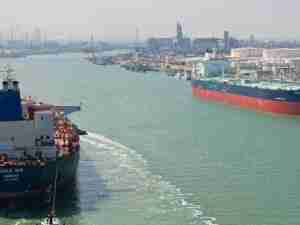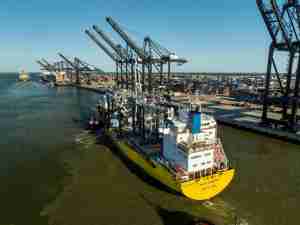The barge-mounted Charleston Giant heavy-lift crane, already the largest floating crane in the Southeast, has increased its certified load capacity from 450 short tons (900,000 pounds) to 500 short tons (one million pounds).
The Charleston Giant, operated by Charleston Heavy Lift, LLC, was first commissioned in 2005 and has been instrumental in the movement of oversize and overweight cargo like turbines and generators, cranes and construction components.
“From the largest shipment to the smallest project, the Port of Charleston has the people, facilities, services and experience to handle any size load,” said Paul McClintock, senior vice president and chief commercial officer at the South Carolina State Ports Authority (SCSPA), which owns and operates the Port of Charleston and the Port of Georgetown.
The Port of Charleston offers four, rail-served terminals to handle diverse breakbulk and project cargo needs and has invested personnel and resources toward growing the non-container segment, establishing a full-time position devoted to non-container sales and marketing last year. The SCSPA Board also approved more than $20 million in improvements to Columbus Street Terminal that will be completed in April 2011.
In recent months, ocean carriers also have increased non-container service in the Port of Charleston. In April, Liberty Global Logistics began inducement calls to Charleston’s Veterans Terminal serving Middle East ports.
In June, Rickmers-Linie announced regular, monthly calls in Charleston as part of its new NCS service, which calls Columbus Street Terminal primarily along with calls at Veterans Terminal. The NCS offers direct connections to ports in Japan, Ecuador, Colombia, Venezuela and Haiti. With four vessels deployed in the service, each with a lifting capacity of up to 120 tons, the carrier has the ability to serve other ports on inducement.
“South Carolina is aggressively growing its non-container cargo business, and these new services are evidence that the state’s base is strong,” McClintock said.
Non-containerized cargo in Charleston and Georgetown is expected to climb 53 percent during the 2011 fiscal year, which ends June 30 of next year.










